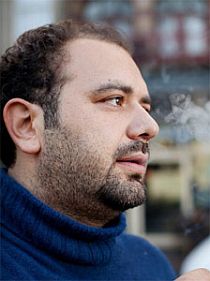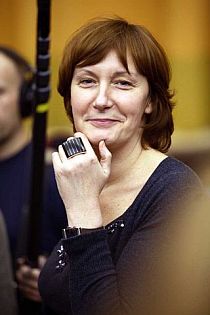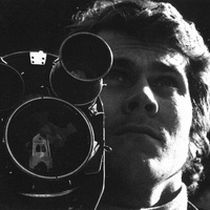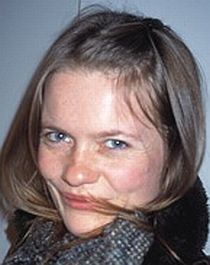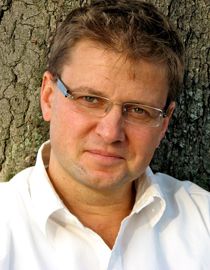Scene efter scene stilles i kø i disciplineret række og forbindes kontrapunktisk med interview- og dialogmateriale, dokumentariske beretninger i løsreven fastholdelse. Det er meningsfuldt i en ganske anden form for filmfortælling end den normale danske tradition; og det er befriende, så befriende…
Ada Bligaard Søby var atter i januar 2014 månedens instruktør i FILMKLUB FOF i Randers. Vi skulle se klip fra nogle af hendes film og snakke om dem, og til sidst skal vi se den da Petey & Ginger – a testament to the awesomeness of mankind og på dens hjemmeside hed det kontant om den: “When the global economy collapses the only true victors are those that weren’t invited to the boom. Petey & Ginger elegantly and honestly documents two very real characters who semi-happily live on the fringes of I-don’t-really-give-a-fuckville-and-that’s-okay-ish. Filmmaker Ada Bligaard Søby again invites us into her ongoing infatuation with the treasure that is the blissfully detached lives of American Losers. Take notes…”
Her havde jeg da samlet, hvad vi til nu har af kommentarer til hendes film, og hvad vi senere suppleret med nye blogindlæg:
AMERICAN LOSERS (58 min., 2006)
I have had occasion to see Ada Bligaard Søby’s film which lasts just under one hour. I am impressed. I cannot bring to mind a more convincing début film in all the years I have been involved with documentary films.
I would like to explain why in a kind of review. It starts with the very first scene. With a glance to the camera, the main character, a woman, invites us to follow this story. Of course this is quite simple and innocent – and it works. We follow willingly. This provides an effective framework.
The next move is of a literary nature, a written sign, white capitals on a black background. Kimberle was born in Arkansas. Then a still from her box of photographs. Then the next sign: She is my best friend. Then back to her archives, then film and inserts behind the sign, illustrating quite simply: She grew up in the Bible Belt. This is how this introductory text is mounted, and then the other player is presented immediately. The director makes absolutely sure that these two are kept in perfect balance and thus we come to expect – and so it proves to be – that this balance between the two separate stories is held throughout the film. Kevin was born in California / He is also my best friend / When I met Kevin he was a bartender / and a high school drop out / He lives in the woods north of New York City / Kimberle lives in New York City / She is 37 years old / (just as the piecing together of the archive material and inserts simply and directly supports the written signs, so does the music, then at this point the vocals come in to sing, telling a story which has never been told..) / Kevin writes / he is 41 / In the fall of 2005 I decided to go make a film about them and their lives / American Losers /


This is a subtle text about two biographies in balance and about a storyteller and portrait photographer and her deliberations: this is not about winners. The montage presented before the title contains all the elements and the whole story in a way. The title gives away the conclusion. I can hardly wait. I must watch this film..
And so I concentrate. What is it about this film? The genre I define quickly, it is film documentary far removed from journalism. The attitude is artistic. The content is more difficult to pin down, it is a mixture of biography, tragedy and comedy, and it borders on a short street musical when we consider the music that comes in at crucial moments. The method is that of a travelogue, and post Chatwin conversations and interviews are added, all of this in direct cinema style but not classical. Here we have the camera as one of the players, the third character. The film is garnished with an abundance of pictorial material, personal archive material and lyrical filming supplying the inserts. The tool is often that of a collage, but as an entirety it is, for the whole hour, a melancholy personal essay about a large ruling culture and about two different and yet so similar attempts at liberation within its dominance.
And it is the story line of the film, a journey along these two lifelines over a period of weeks in the autumn of 2005 as well as a number of flashbacks in the form of statements and archives, which make up the biographies. Two very ordinary stories, so that all kinds of involvement are possible. There is no room here for inquisitiveness, here we just have touching charm and lots of opportunity to fall in love. Ada Bligaard Søby has done detailed research, worked professionally and has ended up with an extremely distinguished cast. Just as one chooses one’s friends. And she has also worked with a manuscript (on paper or in her head) which reveals so much with deep feeling – a manuscript as simple and controlled as the subtly constructed introductory text. Her camera work appears impulsive but is competent and tasteful. It leads me through exteriors and into rooms which together form a set-design I personally find worth revisiting. It is very beautiful. Those who are more knowledgeable than I will probably feel the same way about the music which in itself seems to paint a picture of the USA. Chosen according to the different musical tastes of the characters, I suppose. That would be logical in this carefully planned piece of work.
The dramaturgy is simple, keeping to the style of the introductory text once again. Two journeys in the lives of two people in New York and the nearby area, but yet conclusively outside it.. Edited as parallel stories, but with a twist! They remain separate, remain in an endless constant balance and only the third party, the camera and its voice, keeps them together and shows them to us: look, a lovely couple, aren’t they? But how will their story end? I am so worried.
Ada Bligaard Søby has, on closer inspection, created a very complex piece of film work with apparent lightness. Hard work and concentration have been required in order to ensure that we, the audience, are not forsaken for a second, but that we experience the seriousness of it all as a game of life.
And this was just the first really big film from this cinematographic poetess. We have more, many more, to look forward to! (ABN, review, Sep. 7, 2006)
AMERIKANSKE TABERE (“American Losers”, 2006, som forrige tekst, men på dansk)
Det begynder med allerførste scene. Den kvindelige hovedperson inviterer os med et blik i kameraet til at følge efter i denne historie. Det er selvfølgelig ganske ligetil og uskyldigt – og det virker. Man følger gerne med. Det er en kompetent disposition.
Næste greb er litterært, et tekstskilt, hvide versaler på sorte tekstbånd: “Kimberle was born in Arkansas”. Så still-billede fra hendes æske med fotografier. Så næste skilt: “She is my best friend”. Så arkiv igen, nu film og indklip bag skiltet, illustrerende ganske enkelt: “She grew up in the Bible Belt”. Sådan er denne fortekst monteret, og straks introduceres den anden medvirkende, og instruktøren sørger omhyggeligt for at holde de to i absolut ligevægt og man forventer – og det bliver sådan – filmen igennem denne balance mellem de to adskilte historier holdes… “Kevin was born in California / He is also my best friend / When I met Kevin he was a bartender / and a high school drop-out / He lives in the woods north of New York City / Kimberle lives in New York City / She is 37 years old / (som montagen af arkivstof og indklip enkelt og ligetil understøtter tekstskiltene, gør musikken det også, og netop her kommer vokalen og synger om at fortælle en historie, som aldrig blev fortalt..) / Kevin writes / he is 41 / In the fall of 2005 I decided to go make a film about them and their lives / American Losers /”.


Det er en underfundig tekst om to biografier i balance og om en fortæller og portrætfotograf og hendes overvejelse: dette er ikke vinderpositioner. Montagen før titelskiltet indeholder alle elementer og hele historien for så vidt. Titlen røber konklusionen. Mere kan man næsten ikke spændes op. Den her film vil jeg se…
Og jeg samler mig sammen. Hvad er det med den her film? Genren bestemmer jeg hurtigt, det er filmisk dokumentar milevidt fra journalistik. Attituden er kunstnerisk. Indholdet er vanskeligere at indkredse, det er en blanding af biografi, tragedie og komedie, og det er med musikkens afgørende placering tæt på at være en lille street musical også. Metoden er rejsebeskrivelsens, og der iblandes post-chatwinsk samtaler og interviews alt sammen i direct cinema stil, men ikke klassisk. Her er kameraet medspiller, den tredje karakter. Og der garneres med en overdådighed af billedmateriale, personligt arkivstof og lyriske optagelser til indklip. Grebet er ofte collagens, men helheden er og forbliver timen igennem et vemodigt personligt essay om en stor herskende kultur og om to forskellige og dog så ens frigørelsesforsøg inden for dens dominans.
Og det er så filmens storyline, en rejse gennem disse to livsudfoldelser nogle uger I efteråret 2005 og en række flashbacks i statements og arkiv, som tegner biografierne. To meget almindelige historier, så alle muligheder for engagement er til stede. Her er ikke plads til nyfigenhed, her er kun rørende charme og masser af mulighed for at blive forelsket. Ada Bligaard Søby har foretaget omhyggelig research, båret sig professionelt ad og er endt med en meget fornem casting. Som man vælger venner. Og så har hun filmet efter et manuskript (på papir eller inde i hovedet) så enkelt og stramt og nådesløst kærligt afdækkende som den underfundigt konstruerede fortekst. Hendes impulsivt udseende, men kompetente og smagfulde kameraarbejde fører mig gennem eksteriører og ind i rum, som tilsammen bliver et set-design, jeg personligt finder nye gennemsyn værd. Det er meget smukt. Mere kyndige end jeg vil formodentlig have det sådan med musikken, som forekommer at være en USA- skildring i sig selv. Formodentlig delt op i karakterernes forskellige smag. Det ville være logisk i dette omhyggeligt planlagte værk.
Dramaturgien er enkel som forteksten igen. To rejser i to menneskers tilværelse i New York og i nærheden, men afgørende udenfor… Klippet som parallelhandlinger, men drilsk! De forbliver adskilte, forbliver uafsluttede i konstant balance, alene den tredje medvirkende , kameraet og dets stemme, holder dem sammen og op for vore øjne: se her, er de ikke søde, de to? Men hvordan skal det gå dem? Jeg er så bekymret…
Ada Bligaard Søby har med en tilsyneladende lethed skabt et ved nøjere eftersyn meget kompliceret filmisk værk. Det har krævet hårdt og koncentreret arbejde at sikre, at vi, som er publikum, ikke svigtes et sekund, men oplever denne dybe alvor som en livets leg. Og dette var så bare den første rigtig store film fra denne cinematografiske digterinde. Vi har altså mange, en hel række, til gode. (ABN 7. september 2006)
MEET ME IN BERLIN (17 min., 2007)
Selvfølgelig er Ada Bligaard Søby en ny instruktør, man skal mærke sig. Hendes lange dokumentarfilm American Losers fra forrige år er en bedrift af indlevelse, myndighed, billedmæssig opfindsomhed og fortællemæssig balancekunst. Så jeg var, da jeg så hendes midtvejsfilm fra Super 16, den lille kortfilm om at mødes i Berlin, ekstra på mærkerne. Og det samme nu igen, da den deltager i Odense festivalen. Og det er altså sådan… Jeg bliver sært grebet og konstant optaget og sidder og nikker og mumler: ja, ja… Og det er ikke kun fordi, jeg kender instruktøren, nej, det er den offentlige film, som i den grad optager mig på meget private områder.
Det lader vi ligge. Tilbage til det med balancen. Igen afvejer instruktøren ham og hende på milligram, smukt. Og denne gang skulle de så mødes, lover titlen næsten, vildt. Og jeg røber det: ja, de mødes. Deres samvær er en række telefonsamtaler af et indhold, som jeg ikke finder spor af, det hedder vel “litterær” dybde i (det bliver mit studium ved næste gang jeg ser filmen at udrede det…), men en dialog, som i stedet udvides smerteligt i personernes umærkelige træk i kroppen, minimale bevægelser i ansigtet. Lars Reinholdts kameraarbejde fastholder det i én lang frydefuld række.


Ja, Ada Bligaard kan altså også instruere sådan et fint kammerspil. Og mest af alt ønskede jeg, da jeg genså filmen i aftes, at kortfilmens 17 minutter var begyndelsen blot. Til en rigtig spillefilm i fuld længde. Jeg måtte da følge de to i deres snublende, uheldsvangre kurs mod hinanden i et foretagende, som ikke kan afbrydes. (ABN 20. august 2008)
BLACK HEART (23 min., 2008)
Tre unge skæbner i New York og med New York som medspiller; de holdes skarpt adskilte i filmstil, ja, på alle måder, i en sjælden balance, og i mit hoved griber historierne hen over de markerede grænser i ét væk ind i hinanden i et musikalsk væv af betydninger, så de tre personer bliver hinandens historie. De er jo i samme film..
Vedholdende og inspirerende og fascinerende fortsætter Ada Bligaard Søby sit filmarbejde, hvor hun dels lag for lag undersøger den moderne kærlighed mellem ham og hende og dels i fremstillingen disciplinerer balancen mellem disse to karakterer med en milligram-vægt uden den flimrende lethed i fortællingerne ét sekund slippes. Dertil fornyr hun vores samtids filmbillede med smukke tilføjelser, ganske nye kvaliteter af sikre, personlige valg i både andres arkiv, i instruerede nyoptagelser og sit eget fotografiske materiale. I hendes film bliver alt musik ved siden af den egentlige musik som igen omhyggeligt afmålt slutter sig til billedernes og sætningernes og sindsstemningernes kadencer. Genren er lyrisk film, indholdet poetisk indsigt, stemningen humørfyldt vemod.
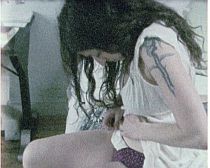
De tidligere film var American Losers, 2006 og Meet Me in Berlin, 2007 og nu i 2008 kommer så en satsning, Black Heart, hvor de to, manden og kvinden, som aldrig så hinanden i den første film, mens de i film to i det mindste nåede til at tale i telefon med hinanden, nu (i et flashback ganske vist) når at blive gift, men hvad sker der så med deres karakterer? En joker, kunstneren bag det sorte hjerte, indføres… (ABN 21. oktober 2008)
COMPLAINTS CHOIR (56 min., 2009)
Ada Bligaard Søbys tidligere film hænger således tydeligt sammen, i sujet, i billedsyn, i opfindsomt konstrueret anderledeshed. De er så selvfølgeligt til stede i tiden nu. Det sted, de vælger at være til stede. Hele rækken er præget af hendes signerende blik. Nu sker der noget andet. Det personlige blik stiller hun i sin nye film til rådighed for en bunden opgave, en redegørelse for og en skildring af det internationale projekt Complaints Choirs art projekt.

Filmen følger to finske korinstruktører, Tellervo og Oliver Kalleinen til Singapore og til Chicago, hvor de sætter Complaints Choir forestillinger op. I Chicago lykkes det at komme igennem, men i Singapore forbyder myndighederne at opføre den færdige samarbejdede klagesang offentlig. Filmen slår således meget aktuel ind i den stadigt voksende Complaints Choirs verdensomspændende bevægelse. (ABN 2.november 2009)
DE NØGNE FRA SKT. PETERSBORG (23 min., 2010)
Titlen siger Skt. Petersborg, så jeg er forberedt. Tavse, højtidelige kadetter i legetøjsuniformer fra fortiden på en fornem plads. Floden, jeg fornemmer, må være Neva. De er alvorlige, tager det alvorligt. Det er én scene. Der står et barn let ophøjet i et dagligt rum og fremsiger et digt. Et gammeldags digt med versefødder og rim og en tilværelsesforståelse, skulle jeg tro, milevidt fra barnets. Det er en anden scene. Og i et sted i mig selv forstår jeg spontant noget ordløst om patosens væsen.
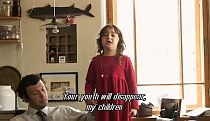
Og netop det må være filmens indhold og anliggende. Denne nøgne alvor. Denne fremmedartede vilje til den store gestus, som jeg til min forbavselse genfinder hos mig selv, efterhånden som scene, omhyggeligt overvejet mærker jeg, føjes til scene i en juxtapositions strategi som hos Marker og Godard. Mere end en forælling af billeder er det en udfordring af billeder. På filmselskabets hjemmeside beskriver Ada Bligaard Søby i en lille elegant tekst sine overvejelser i et fuldkomment manifest over den tavst forsigtige og antydede antropologi, hun udfolder i filmen, ja, i alle sine film. Mere end en forklaring og fortolkning læser jeg teksten som instruktørens egen forbavsede opdagelse af sin russiske film:
For russerne er det ingen skam at være politisk ukorrekte eller følelsesmæssigt uforudsigelige. Mennesker er ikke rationelle. Man tror på heldet, miraklerne, skæbnen og Gud, og man forventer ikke at tingene passer ned i nogle særlige og rigtige kasser. Hvis en kvinde går fra sin mand direkte over til en ny, er der ingen, der forventer en forklaring. For sådan er livet. Der sker hele tiden noget, vi ikke kan gøre noget ved.
Det er sådan, jeg oplever Rusland og russerne, og det er det, der fascinerer mig ved landet. Jeg har en frihedsfornemmelse i mig, når jeg er i Rusland. Der er sus i skørterne og store armbevægelser. Jeg mærker overalt en stræben og higen efter det det pragtfulde, det storladne, det ekstraordinære. Det er tydeligt i arkitekturen. Men det er lige så tydeligt hjemme omkring køkkenbordet.
Russerne værdsætter og stiler efter det sublime. Et ideal i Rusland er at tåle alt. Mennesker, der gennemgår store, måske endda overmenneskelige prøvelser og eventuelt risikerer døden, bliver der set op til. Derfor har ugebladene ikke historier om de kendtes skilsmisser og psykologiske nedture. Der er ikke meget lyst til identificere sig med dem, der viser, at de ‘bare er helt almindelige mennesker’.
Russerne har en skæbne – ikke et liv. Derfor affinder de sig også med de sider af livet og af det russiske samfund, som vi i Danmark og Vesten opfatter som umenneskelige og utålelige. Lige som amerikanerne har russerne ‘den russiske drøm’: At Rusland bliver et stort samlet rige, at russerne viser resten af verden, hvilket et prægtigt land de har. I Danmark hylder vi hverdagen, mens de i Rusland ikke kan få det højtravende nok. I vores samfund bestræber vi os på at mindske smerten mest muligt, vi passer på hinanden og forsøger med en stemmeseddel i hånden på bedste vis at skabe lighed. Russerne er derimod kollektive omkring deres storhed, men samtidig uafklarede om deres forhold til det politiske system, de er borgere i. Det store system er godt – det skal bare passe sig selv og sørge for, at der er arbejde til alle, og at verden ikke går af lave. Imens bør mennesket have frit slag til at gebærde sig og sno alle regler.
Jeg vil i filmens scener vise frihedsfølelsen og den anderledes tilgang til livet, som jeg mærker, som fremmed i Rusland – en følelse, der fascinerer, fordi den fortæller mig, at livet kan være, hvad man selv gør det til. Jeg er præget af det nordiske tungsind, af at tænke rationelt og kontrollere mine reaktioner og følelser. Jeg har en grundpille, som består af dansk fornuft, demokrati og retfærdighed. Men nu vil jeg gerne lave en film, hvor publikum skal forføres af det rum af vildskab der skabes, når min nordiske tankegang sættes ud af spil.
Vintersolbaderne foran Peter-Paul-Fæstningen udtrykker storheden, stoltheden og livets rå virkelighed. Deres nøgenhed imod en bar mur står i modsætning til byens overdådige påklædthed og er en konkret og realistisk afklædning af facaden og beskyttelsen.
Jeg vil gerne berøre livets skønhed og den evige higen efter en følelsesmæssig dimension i tilværelsen og det at være et ‘kultiveret menneske’. Jeg vil berøre den russiske stolthed, det at føle sig som en del af en meget større sammenhæng og i denne finde et unikt fællesskab. Men jeg vil også vise de vilkår, som er bagsiden af denne skønhed, stolthed og kultur. Jeg vil vise den ‘smukke løgn’, men også ‘den triste sandhed’. (Ada Bligaard Søby, 2009)
Scene efter scene stilles i kø i disciplineret række og forbindes kontrapunktisk med interview- og dialogmateriale, dokumentariske beretninger i løsreven fastholdelse. Det er meningsfuldt i en ganske anden narration end den normale danske tradition; og det er befriende, så befriende. Og glædeligt. Ada Bligaard Søby er efter udflugten med de klagende kor vendt tilbage til sin helt egen metode og tilbage til den overraskende ligefremhed i American Losers, til den udvidende billedskønhed og kontrollerede smerte i Black Heart og til brevvægtens milligrams balancekunst i Meet me in Berlin. De nøgne fra Skt. Petersborg er på kun 23 minutter. De mærkes som en vidunderlig begyndelse til en meget lang og rig film. Mere, mere mumler jeg ved slutteksternes opdukken. Det er en meget sjælden oplevelse.
På CPH:DOX festival 2010 modtog Ada Bligaard Søbys De nøgne fra Skt. Petersborg en delt pris Danish:Dox Award (sammen med Jakob Boeskovs Empire North), som bedste danske dokumentarfilm.
Juryen begrundede valget af De nøgne fra Skt. Petersborg med instruktørens særligt kreative udtryk og evne til vedholdende at være i stand til at imponere sit publikum med et stærkt visuelt udtryk: “Scenerne er bundet sammen med et unikt blik og en meget personlig palet af farver, situationer, stemninger og følelser.” (ABN 18. juni 2010)
PETEY & GINGER (59 min. 2009)
Ada Bligaard Søby har i lidt mere end syv år været i gang med et konsekvent filmisk værk, som med undertitlen til den seneste af de syv film, det består af, også samlet kan kaldes a testament to the awesomeness of mankind. Det er store ord, men de siges på en stilfærdig måde. Der larmes ikke i hendes film, men hver rystende detalje, hvert udbrud af pludseligt vid præcist på plads i konstruktionerne, er fyldt med intens og sagte alvor: dette er mine ønsker for menneskets fremtid, og i et kaos af nutidig moralsk og materiel sammenbrud skimtes i filmene en forunderlig blid fasthed og en ærbødighed over for enhver kulturs integritet og historie. Alle filmene har, uden at Ada Bligaard Søby har rystet på hånden, i et og alt intenst levet op til de store ord. Der har været bygget og bygget på værket.
Sådan er det derfor selvfølgelig med den syvende og seneste film, Petey & Ginger, som havde premiere på CPH:DOX november 2012 og har været sendt for nylig på DR K. Den skal ikke først og fremmest nye veje, den skal videre med det, værket er i gang med. Så den vender tryg tilbage til den første film, American Losers (2006) i tema, den amerikanske kultur, og i kunstnerisk greb, en sammenstilling af en kvindes og en mands biografier og liv nu. I denne tilbagevenden, i denne sunde vedholdenhed fremstår den som en rig variation i en filmisk passacaglia.
Som i American Losers lægger Ada Bligaard kortene på bordet fra begyndelsen: jeg er ved at lave en film med mine venner, de er her: og vi får en scene med et samvær en aften. Instruktøren har samlet dem til en fest, et måltid i hvert fald, vi er formodentlig ved optagelsernes afslutning, de præsenterer sig for hinanden, de kender nemlig ikke hinanden, i hvert fald ikke alle, de er musikere i samme band, en del af dem, og så er der to, som er gift med hinanden, og der er fotografen Adam Nilsson og Ada Bligaard selv. Det er en hurtig, lidt genert og aldeles autentisk scene, sådan er det med det. Og herefter er filmen i gang, de to hovedpersoner skiller sig ud fra de andre medvirkende. Som i den første film: ”Ginger er min bedste ven, Petey er også min bedste ven”, kunne der have stået på speedmarker skilte. De to tager over og kommenterer deres samfund, deres tid og deres egne biografier, som de fortæller markante træk fra.


Det bliver til et helt andet end vanligt tidsbillede af årtierne omkring årtusindskiftet, Ada Bligaard tegner, en anden USA historie. Imperiets storhed er, ser det ud til, forbi, det er forfaldets kapitler, som nu skrives. Det vokser til en overvejelse af magthavernes, de økonomiske beslutningstageres dekadence, til en meditation over frådseriet og den flossede moral for øjnene af flere og flere fattige blandt menneskene, flere og flere, som lever sat på gaden åbenbart som følge af finansfolkenes dispositioner.
Men nogle af menneskene er rene af hjertet, og Petey og Ginger hører til den gruppe, på hver deres måde, som dog både er forskellige og ligner hinanden. Ada Bligaard kæmper som i andre film af sine film, ud over den nævnte American Losers og særlig fornemt i Meet me in Berlin (2007), en film om et muligt møde mellem hende og ham, så forskellige, men bevæget af den samme ømhed for hinanden i et mærkeligt fællesskab, hun arbejder energisk, men med dejlig let hånd på at holde balancen mellem de to personer, hun hver gang placerer på vippen. Og det bliver hver gang til klippekunstens vanskelige balancegang, på én gang holde fokus for iagttagelserne og balance i de ligevægtede karakterers udvikling. Netop det er Ada Bligaards særkende, et af dem. Det kan hun, det er en del af den cinematografiske musikalitet hun er begavet med.
En anden del af talentet er det hos hende selvfølgelige, men ganske særprægede billedsyn, som driver kameraet til optagelser, hvis stilfærdige skønhed berører dybt, ikke kun mig, men som nævnt tidligere for eksempel også juryen, som gav hende prisen på CPH:DOX 2010. Den begrundede valget af De nøgne fra Skt. Petersborg (2010) med instruktørens ”særligt kreative udtryk og evne til vedholdende at være i stand til at imponere sit publikum med et stærkt visuelt udtryk”… “Scenerne er bundet sammen med et unikt blik og en meget personlig palet af farver, situationer, stemninger og følelser.” Det samme kunne siges om alle Ada Bligaards film og således også om Petey & Ginger. Ved sine egne optagelser, ved sine instruktioner til den kongenialt fotograferende Adam Nilsson og i høj grad også ved den overraskende dristige brug af arkivmateriale, ofte ganske privat og ofte af overfladisk set ret tvivlsom kvalitet, ser hun og aflokker det besynderlige æstetiske kvaliteter, der udgør billedmæssige territorier, som til nu var ukendte for i hvert fald mig. I sig selv en opdagelsesrejse.
En tredje del af Ada Bligaards kunstneriske særpræg er alvoren bag det hele og den ganske originale og naturlige evne, hun har til nå dybde i den filmiske tænkning. Petey & Ginger bliver og er således først og fremmest et personligt essay om moderne fattigdom på grundlag af en antropologisk undersøgelse, en poetisk og filmisk etnografi, som kommer tydeligt igennem. Efter at have set filmen sidder jeg helt stille, for det her er egentligt tankevækkende. Det er ikke en bekymring, dog, det ligner, men det er noget mere, det er en stille fortvivlelse. Ada Bligaard Søby ser det vist ikke selv sådan, jeg læser imidlertid filmen sådan, og så rigt er værket, det kan bag ryggen på sin autor forstås ud fra en lang række andre forudsætninger, og jeg er sikker på, der er svar til dem alle. Elementerne er for så vidt enkle og sædvanlige, men kvaliteten af dem er overraskende og overrumplende, ny og frigørende. Jeg har ikke set det tilsvarende i nogen anden af den nye bølge af berømmede danske dokumentarfilm. Dette er enestående i filmverdenens nu. Måske er Ada Bligaards arbejde især mærket af en munter uskyld på trods, på sin måde lig Peteys og Gingers liv. (ABN 17. januar 2013)
FILMOGRAFI
Ada Bligaard Søbys filmografi er flot, tegner en usædvanlig disciplin og vedholdenhed, og ser man filmene i række, opdager man en trofasthed over for temaernes fortsatte bearbejdning, de giver stadigt mere og nyt fra sig:
American Losers, DK 2006, 58 min. Manuskript: Ada Bligaard Søby, fotografi: Ada Bligaard Søby og Josh Nussbaum, klip: Charlotte Munch Bengtsen, producer: Lise Saxtrup, produktion og salg: Klassefilm http://www.klassefilm.dk/
Meet me in Berlin, DK 2007, 17 min. Manuskript: Ada Bligaard Søby og Tobias Lindholm, fotografi: Lars Reinholdt, klip: Francois Gedigir, musik: Jonas Leopold og Howie B, lyddesign: Roar Skau Olsen, konsulent: Henrik Ruben Genz, producer: Morten Kjems Juhl, produktion og salg: Beofilm juhl@beofilm.dk
Black Heart, DK 2008, 23 min. 35 mm. Producer: Morten Kjems, produktion og salg: Beofilm juhl@beofilm.dk
Complaints Choir, DK 2009. 56 min. Manuskript: Ada Bligaaard Søby, fotografi: Ada Bligaard Søby og Josh Nussbaum, klip: Charlotte Munch Bengtsen, musik: Anders Trentemøller, lyddesign Roar Skau Olsen, producer: Morten Kjems Juhl, produktion og salg: Beofilm juhl@beofilm.dk Filmen kan ses på filmstriben.dk
De nøgne fra Skt. Petersborg, DK 2010, 23 min. Manuskript: Ada Bligaard Søby, camera: Max Efros og Ada Bligaard Søby, klip: Nanna Frank Møller, sound design: Roar Skau Olsen, producer: Lise Saxtrup, produktion og salg: Klassefilm http://www.klassefilm.dk/ Filmen kan ses på filmstriben.dk
Master Chen Lives on 88 Lucky Street, DK 2010. Instruktion: Ada Bligaard Søby og Zero Lin, producere: Tine Fischer og Wendy Kuan, produktion og salg: DOX:LAB doxlab@cphdox.dk
Petey & Ginger, Danmark, 2012. 59 min. Manuskript: Ada Bligaard Søby, medvirkende: Ginger Partington og Petey Damnit, fotografi: Adam Nilsson og Ada Bligaard Søby, klip: Charlotte Munk Bengtsen, musik: The Oh Sees (og mange flere), lyddesign: Roar Skau Olsen, producer: Morten Kjems Juhl, Anna Byvald og Frank Mauceri, produktion og salg: Beofilm interfere@beofilm.dk www.beofilm.dk http://peteygingerfilm.com/#Home
samt i produktion Fuck Forever, England/Danmark. Trailer: http://adabligaardsoby.com/Fuck-Forever




